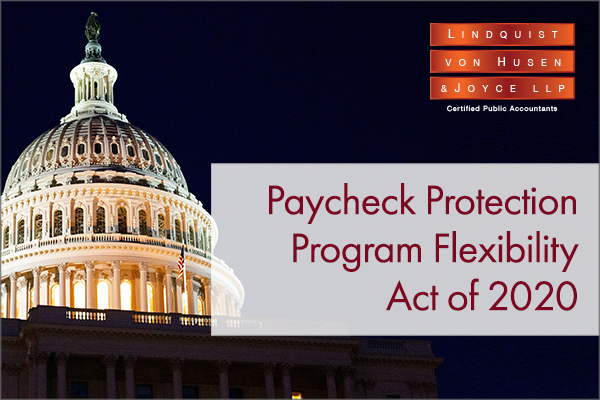
The Paycheck Protection Program Flexibility Act (PPPFA) was signed into law on June 5, 2020, to modify certain provisions related to the forgiveness of loans under the Paycheck Protection Program (PPP). One change allows recipients of loan forgiveness under PPP to also defer a portion of 2020 payroll taxes, but there are several other modifications. The following chart summarizes the key provisions compared to the original CARES Act provisions.
In addition, the SBA and U.S. Treasury issued a joint statement on June 8, 2020, to clarify questions around modified forgiveness eligibility if less than 60% of PPP funds are used for payroll during the covered period. Partial forgiveness remains, according to their joint statement.
The following chart summarizes the key provisions compared to the original CARES Act provisions, including clarifications included in the recent joint statement.
|
PPP (CARES Act) |
PPP Flexibility Act |
|
|
Loan Forgiveness Covered Period |
Eight weeks from the time the loan proceeds are disbursed to the borrower. |
New borrowers will have 24 weeks from the time the loan proceeds are disbursed to the borrower, but the Covered Period cannot extend past Dec. 31, 2020. Current borrowers with PPP loans can choose to extend the eight-week period to the 24-week period. |
|
Payroll Expenditure Requirement |
At least 75% of the loan proceeds must be used for payroll costs. If less than 75%, a portion of the loan will be ineligible for forgiveness. |
At least 60% of the loan proceeds must be used for payroll costs. If less than 60 percent, a portion of the loan will be ineligible for forgiveness. |
|
Extension of Loan Repayment Period |
Two years for any portion of the loan not forgiven. Interest rate is 1%. |
For new borrowers, five years for any portion of the loan not forgiven. For loans already in existence with a two-year repayment period, lenders and borrowers can renegotiate the loan terms to match the five-year repayment period. Interest rate is 1% |
|
Forgiveness Reduction Based on Full-Time Equivalent Employees |
The borrower can exclude from the full-time employee equivalency calculations only those employees who turned down good faith offers to be rehired at the same hours and wages as before the pandemic. |
Loan forgiveness will now be determined without regard to a proportional reduction in the number of full-time equivalent employees if the borrower can document in good faith: (1) an inability to rehire individuals who were employees of the borrower on Feb. 15, 2020; and (2) an inability to hire similarly qualified employees for unfulfilled positions on or before Dec. 31, 2020. Alternatively, relief from proportional reduction can be obtained if the borrower is able to document an inability to return to the same level of business activity as such business was operating at before Feb. 15, 2020, and the inability was due to adherence to COVID-19 related operating restrictions mandated by specified federal agencies during the period between Mar. 1, 2020, and Dec. 31, 2020. |
|
Rehiring Employees |
Employees who were terminated between Feb. 15, 2020, and Apr. 26, 2020, had to be rehired prior to June 30, 2020, in order to be included in the calculation of full-time equivalent employees. |
For calculating the full-time equivalent employees, the deadline to rehire employees who were terminated between Feb. 15, 2020, and Apr. 26, 2020, is now changed to Dec. 31, 2020. |
|
Deferral of Employer Payroll Taxes |
Businesses that received a PPP loan could not also defer the employer portion of 2020 FICA payroll taxes once their loan was forgiven. The deferral permits 50% of the payroll tax liabilities for the period of Mar. 27, 2020, to Dec. 31, 2020, to be paid by Dec. 31, 2021, and the remaining 50% payable by Dec. 31, 2022. |
Businesses that received a PPP loan are now also allowed to defer payment of the payroll taxes under the same deferral periods, even if their loan is forgiven. |
|
Deferral of Principal, Interest, and Fee Payments on a PPP Loan |
Repayment of principal, interest, and any fees are deferred for a period of not less than six months and not more than one year from the loan origination date. |
Repayment of principal, interest, and any fees are deferred until the date that the amount of forgiveness is remitted by the SBA to the lender. A borrower must submit an application for forgiveness within 10 months after the last day of the Covered Period; failure to submit a forgiveness application will result in a termination of the deferral period on the first day after the date that is 10 months after the last day of the Covered Period. |
The complete PPPFA content is available here: https://www.congress.gov/bill/116th-congress/house-bill/7010/text
If you have any questions, please contact us at info@lvhj.com.
You may also be interested in our blog post about the PPP forgiveness application and related instructions.








